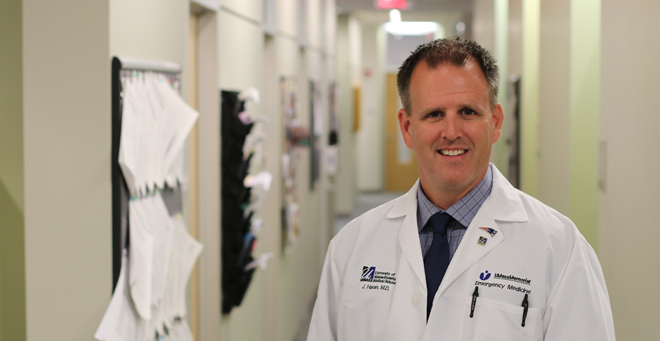 |
|
|
John Haran, MD, PhD |
Nearly 30 percent of nursing home residents carry the potentially fatal intestinal bacteria Clostridium difficile. To address this growing public health problem, physician-scientist John Haran, MD, PhD, and collaborators are focusing on the microbiome as a conduit to reduce the risk of C. diff infection in nursing homes. With a new grant from the National Institute on Aging, they will study the microbiome, the vast array of intestinal microbes that influence human health and disease, among elders as they transition from community living to long term care. Researchers hope to identify changes in the microbiomes that may make older adults more susceptible to infection.
“Age-related changes in the intestinal flora are associated with an increased risk of C. diff infection in older adults; however, these risk factors alone do not adequately explain the increased risk of infection and its severity in residents of long term care facilities,” said Dr. Haran, associate professor of emergency medicine and microbiology & physiological systems. “A greater understanding of factors that place older adults in long term care facilities at increased risk for developing C. diff infection would help better guide preventive strategies and improve elder outcomes.”
Haran has seen first-hand the ravages of C. diff infection as an emergency medicine attending physician, and has conducted previous studies about factors, including the nursing home environment, that shape the microbiome and C. diff colonization.
“We already know that the microbiomes of elders in the community versus long term care are very different from each other, and we’re seeing patterns of maladaptation of the microbiome in those already in nursing homes,” he said. “The question this grant asks is if we follow a group of elders as they’re living in the community and then transitioning into the nursing home, what happens over time, how do their microbiomes change, and does that lead to increased risk for C. diff colonization?”
The new study will follow a cohort of 100 adults 65 and older who are being admitted for the first time to long term care facilities throughout Massachusetts. Investigators will collect a baseline stool sample during the first two days of admission, then serially afterwards for up to 12 months. Clinical data and antibiotic use will be recorded. The ultimate goal of this and future studies is to create a predictive algorithm for personalized, real-time evaluation of C. diff colonization risk for patients being treated with antibiotics.